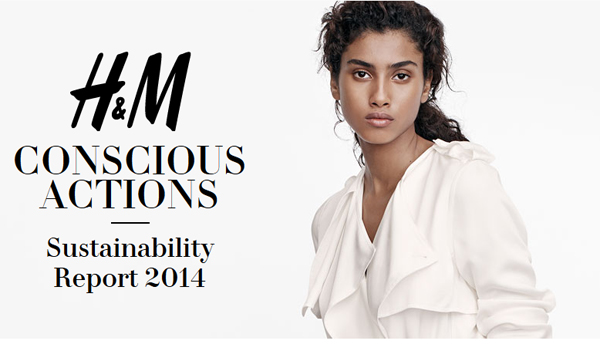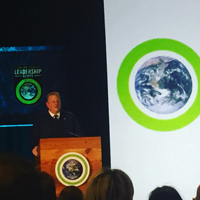
Two leaders of the sustainable fashion movement, H&M and Kering, share their latest information and knowledge this week on what they are doing to create a more sustainable future.
First, H&M released their Conscious Actions Sustainability Report 2014. The progress made shows that H&M is at the forefront of sustainability. Some of the highlights are the expansion of the public supplier factory list, the ambition to only use renewable electricity and the increase of the amount of products made of recycled cotton from collected garments with 300 percent. In addition, H&M sees positive development in the continuous work towards fair living wages.
“We started to test the so called Fair Wage Method, developed by the independent Fair Wage Network, in three role model factories. Although it’s still early in the process, the initial results from the first factory that’s been evaluated are promising. Based on these learnings, we aim to scale this up to all our strategic suppliers by 2018 at the latest,” says Karl-Johan Persson, CEO at H&M.
This is the 13th report published by H&M, outlining the progress of over more than 80 important Conscious Actions covering every stage of H&M’s products lifecycle – all the way from the cotton field to giving clothes that you no longer need a new life. Amongst these are several ambitious goals, including:
H&M expands its public supplier list to include 2nd tier suppliers
H&M has now taken yet another major step for increased transparency across the entire value chain; the most important mills that provide our suppliers with fabrics and yarns have been added to the public supplier list. The fact that transparency and mutual trust with suppliers is crucial and the starting point for all change, makes H&M convinced that this will promote transparency and drive further positive change in the textile industry.
H&M goes all in for renewable electricity
Tackling climate change is one of the major challenges of our time. H&M wants to lead the way by only using renewable energy wherever possible already by the end of 2015; meaning about 80% of all electricity. Today, the same number is 27%. By doing this, H&M will reduce its climate impacts – way below what climate science tells us to do.
H&M increases the amount of products made from collected garments with 300 percent
Since last year, H&M has more than doubled the amount of collected garments within the garment collective initiative. In total, more than 13,000 tons of textiles have been collected – that is as much fabric as in 65 million T-shirts. Now, the new goal is to increase the amount of products made of recycled fibers by at least 300% by the end of 2015.
The entire report and a summary of its highlights are available to read and download here.

Francois-Henri Pinault, chairman and CEO of Kering, owners of luxury brands such as Gucci and streetwear/action sports brand Volcom and an investor in surf-inspired eco brand Outerknown by Kelly Slater, believes business success and being sustainable go hand in hand: it’s simply smart business. And he wants to share his group’s knowledge, even with competitors.
Speaking at Parsons The New School for Design in New York during a Kering Talk last week, he declared: “We will share EP&L [environmental profit & loss account] methodology with anyone interested in the industry. If we keep it as a competitive advantage, we completely miss the point! Fashion and sustainability will be one and the same.”
He was taking part in the discussion Why sustainable fashion is smart business with representative experts in the environment and education: Natural Resources Defense Council health and environment director Linda Greer; Parsons Associate in Applied Science (AAS) program director Timo Rissanen and Parsons board of governors’ member Simon Collins. The conference was attended by an invited audience of 400, who included opinion leaders, the press and 250 students.
This was the third edition of Kering Talks, a series of conversations organized in conjunction with Fast Company magazine, featuring luminaries and creative minds whose goals are to ignite innovation and inspire social change. Topics include: creativity, women’s empowerment, sustainability and young talent.
Fast Company is a cutting-edge publication that reports on how ‘fast companies’, start-ups and entrepreneurs, are developing The Next Big Thing, exploring new design or leading with a new vision.
For more information on youth culture and sustainability, check out our subscriptions and 3rd Annual Sustainability and the State of Youth Culture Report.


